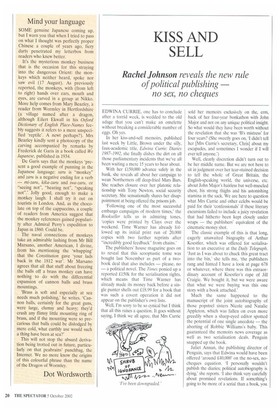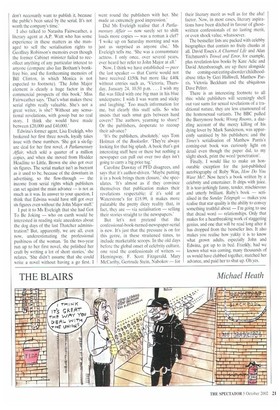KISS AND SELL
Rachel Johnson reveals the new rule
of political publishing no sex, no cheques
EDWINA CURRIE, one has to conclude after a torrid week. is wedded to the old adage that you can't make an omelette without breaking a considerable number of eggs. Oh yes.
In her kiss-and-sell memoirs, published last week by Little, Brown under the silly, faux-academic title, Edwina Currie: Diaries 1987-1992, she finally dishes the dirt on all those parliamentary incidents that we've all been waiting a mere 15 years to hear about.
With her £150,000 advance safely in the bank, she reveals all about her campaign to wean Northerners off deep-fried Mars Bars. She reaches closure over her platonic relationship with Tony Newton, social security secretary. She sensationally shares her disappointment at being offered the prisons job.
'Following one of the most successful embargo campaigns of modern times,' the Bookseller tells us in admiring tones, 'copies were printed by Clays over the weekend. Time Warner has already followed up its initial print run of 20,000 copies with two further reprints after "incredibly good feedback" from chains.'
The publishers' house magazine goes on to reveal that this scooptastic tome was bought last November as part of a twobook deal that also includes — please. no — a political novel. The Times ponied up a reported £150k for the serialisation rights, which means that Time Warner has already made its money back before a single punter shells out £18.99 for a book that was such a covert operation it did not appear on the publisher's own lists.
Well, I'm sorry to be so cynical but I think that all this raises a question. It goes without saying, I think we all agree, that Mrs Currie
sold her memoirs exclusively on the, erm, back of her four-year bonkathon with John Major and not on any unique political insight. So what would they have been worth without the revelation that she was 'B's mistress' for four years? (She sweetly goes on, 'I didn't tell her [Mrs Currie's secretary, Chris] about my escapades, and sometimes I wonder if I will ever tell anyone.')
Well, clearly discretion didn't turn out to be her middle name. But we are not here to sit in judgment over her tear-stained decision to tell the whole of Great Britain, the English-speaking world, the universe, etc. about John Major's hairless but well-muscled chest, his strong thighs and his astonishing stamina in the sack. We are here to question what Mrs Currie and other celebs would be paid for their 'confessionals' if these literary excursions failed to include a juicy revelation that had hitherto been kept closely under wraps — the publishers' equivalent of the cinematic money shot.
The classic example of this is that long, eagerly unawaited biography of Arthur Koestler, which was offered for serialisation to an executive at the Daily Telegraph. 'Just as I was about to chuck this great tract into the bin,' she tells me, 'the publishers rang and hinted I have a look at page 678 or whatever, where there was this extraordinary account of Koestler's rape of Jill Craigie. We bought it, but we were aware that what we were buying was this one story with a book attached.'
Much the same happened to the manuscript of the joint autobiography of those popstrel sisters Nicole and Natalie Appleton, which was fallen on even more greedily when a sharp-eyed editor spotted the potential of one single anecdote — the aborting of Robbie Williams's baby. This guaranteed the memoirs news coverage as well as two serialisation deals. Penguin snapped up the book.
Juliet Annan, the publishing director of Penguin, says that Edwina would have been offered `around £40,000' on the no-sex, nocheques equation. 'I personally wouldn't publish the diaries; political autobiography is dying,' she reports. 'I also think very carefully about promised revelations. If something's going to be more of a serial than a book, you don't necessarily want to publish it, because the public's been sated by the serial. It's not worth the company's time.'
I also talked to Natasha Fairweather, a literary agent at A.P. Watt who has some experience in these matters as she managed to sell the serialisation rights to Geoffrey Robinson's memoirs even though the former Cabinet minister failed to recollect anything of any particular interest to anyone (compare also Ian Botham's bonkfree bio, and the forthcoming memoirs of Bill Clinton, in which Monica is not expected to footnote). The John Major element is clearly a huge factor in the commercial prospects of this book,' Miss Fairweather says. 'That's what makes these serial rights really valuable. She's not a great writer, is she? Without any sensational revelations, with gossip but no real story, I think she would have made between £20,000 and £40,000.'
Edwina's former agent, Lisa Eveleigh, who brokered her first three novels, loyally takes issue with these numbers. She got a six-figure deal for her first novel, A Parliamentaly Affair. which sold a quarter of a million copies, and when she moved from Hodder Headline to Little, Brown she also got over six figures. The serial market isn't as buoyant as it used to be, because of the downturn in advertising, so the flow-through — the income from serial rights which publishers can set against the main advance — is not as much as it was. In answer to your question, I think that Edwina would have still got over six figures even without the John Major stuff.'
I put it to Ms Eveleigh that she had Got To Be Joking — who on earth would be interested in reading stale anecdotes about the dog days of the last Thatcher administration? But, apparently, we are all, even now, underestimating the professional pushiness of the woman. 'In the two-year run up to her first novel, she polished her craft by writing a lot of short stories.' she relates. 'She didn't assume that she could write a novel without having a go first. I went round the publishers with her. She made an extremely good impression.'
Did Ms Eveleigh realise that A Parliamentary Affair — now surely set to shift loads more copies — was a roman a clef? 'I woke up on Saturday morning and was just as surprised as anyone else,' Ms Eveleigh tells me. 'She was a consummate actress. I only once, over several years, ever heard her refer to John Major at all.'
Now, I think we have established —pace the last speaker — that Currie would not have received 1150k but more like £40k without entries such as, 'Victoria, Thursday. January 24, 10.50 p.m. . . I wish my flat was filled with one big man in his blue underpants; I wish I was warm and sticky and laughing.' Too much information for me, but clearly this stuff sells. So who insists that such smut gets between hard covers? The authors, yearning to share? Or the publishers, desperate to recoup their advance?
'It's the publishers, absolutely,' says Tom Holman of the Bookseller. 'They're always looking for that big splash. A book that's got interesting stuff here or there but nothing a newspaper can pull out over two days isn't going to carry a big price tag.'
Caroline Dawnay of PFD disagrees, and says that it's author-driven. 'Maybe putting it in a book brings them closure,' she speculates. 'It's almost as if they convince themselves that publication makes their revelations respectable: if it's sold at Waterstone's for £18.99, it makes more palatable the pretty dicey reality that, in fact, they are — via serialisation — selling their stories straight to the newspapers.'
But let's not pretend that the confessional-book-turned-newspaper-serial is new. It's just that the pressure is on for this genre, in these straitened times, to include marketable scoops. In the old days before the global onset of celebrity culture, one read the confessionals of writers — Hemingway. F. Scott Fitzgerald, Mary McCarthy, Gertrude Stein, Nabokov — for their literary merit as well as for the aha! factor. Now, in most cases, literary aspirations have been ditched in favour of ghostwritten confessionals of no lasting merit, or even shock value, whatsoever.
The bestseller lists are packed with celebby biographies that contain no fruity chunks at all. David Essex's A Chamzed Life and Alan Titchmarsh's Trowel and Error, for example, plus revelation-less books by Kate Adie and David Attenborough, are up there alongside
the coming-out/eating-disorder/childhoodabuse titles by Geri Halliwell, Matthew Parris, Victoria Beckham and the ubiquitous Dave Pelzer.
There is an interesting footnote to all this: while publishers will seemingly shell out vast sums for sexual revelations of a traditional nature, they are less enamoured of the homosexual variants. The BBC pulled the Barrymore book; Wrong Rooms, a dazzling account of the mercy killing of his dying lover by Mark Sanderson, was apparently sanitised by his publishers; and the Times's serialisation of Matthew Parris's coming-out book was curiously light on detail even though the paper did, to my slight shock, print the word 'penetration'.
Finally, I would like to make an honourable exception for the just-published autobiography of Ruby Wax, How Do You Want Me?. Now here's a book written by a celebrity and entertainer. It drips with juice. It is tear-jerkingly funny, tender, mischievous and utterly brilliant. Ruby's book — serialised in the Sunday Telegraph — makes you realise that star quality is the ability to convey something truthful about — I'm going to use that dread word — relationships. Only that makes for a heartbreaking work of staggering genius, and one that will be read long after it has dropped from the bestseller lists. It also makes you realise how yuldcy it is to know what grown adults, especially John and Edwina, got up to in bed. Frankly, had we known what was coming, many thousands of us would have clubbed together, matched her advance, and paid her to shut up. Oh yes.
Michael Heath





































































 Previous page
Previous page